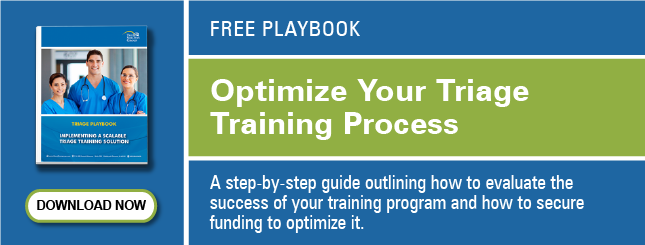 Challenges in a Post COVID World
Challenges in a Post COVID World
The national nursing shortage makes recruiting and retaining quality nursing staff extremely competitive. While facilities may have traditionally required 3-5 years of emergency department (ED) experience before training a nurse for triage, the lack of resources has forced some organizations into reducing the requirement to one year or less. As this requirement decreases, it is increasingly critical to have a well-defined onboarding path for nurses new to triage.
Additionally, having well-defined role expectations—especially during onboarding—can have a significant impact on a nurse’s job satisfaction and the likelihood they will stay with your organization.
Nurses do not leave even the toughest healthcare situations; they leave suboptimal managers/leaders who provide inadequate orientation and onboarding. We also know that frontline nurse leaders are the key players in recruitment in their organizations.
Tools to Guide Your Onboarding Process
The following list of tips and tools are extremely applicable to triage trainers, now more than ever. Furthermore, nurse leaders at all levels—from charge to manager—can be proactive today in their own settings by taking some or all the following steps to ensure effective onboarding:
Present a Realistic Picture:Provide new graduates with a transparent view of the environment, including challenges and ongoing initiatives.Have a Hands-On Approach:Personally engage in the onboarding process rather than delegating it to others, ensuring continuous follow-up.Assess Skill Gaps Positively:Identify areas for improvement constructively, instilling hope and emphasizing learning and growth.Recognize Supportive Preceptors:Acknowledge and reward preceptors who exhibit supportive behavior towards new graduates.Create Zero Tolerance for Bullying:Foster a culture of zero tolerance towards bullying, particularly directed at new graduates, and intervene promptly when necessary.Perform Frequent Check-Ins:Schedule regular check-ins with new graduates throughout their first year, especially post-residency, to provide support and guidance.Monitor Patient Assignments:Ensure that patient care assignments for new graduates are appropriate, adjusting as needed to support their development.Assist with Communication:Support new graduates in their interactions with physicians and other departments, addressing any signs of disrespect or lack of confidence.Seek Feedback:Maintain visibility on the unit and actively seek feedback from new graduates to address concerns and improve the onboarding experience.Ensure Participation in Support Programs:Despite staffing shortages, encourage participation in orientation and support classes, prioritizing the development of new graduates.
Going Forward
Effective onboarding has never been more critical, especially as it forms the foundation of ongoing triage competency. By implementing these tools and strategies, preceptors, mentors and nursing leaders can provide authentic support during the challenging transition into a new profession.
Summary
Nurses stay in roles where they feel valued, respected and appreciated. A well-defined onboarding process to triage provides each new nurse the opportunity to understand what it takes to be successful within their new role and allows them to fulfill their greatest potential within your organization. We hope this checklist guides you toward a system you can feel confident will improve consistency in triage and ensure high-quality patient care.
References:
(1) Gallup Poll. U.S Ethics Ratings Rise for Medical Workers and Teachers. December 2020. Retrieved from: https://news.gallup.com/poll/328136/ethics-ratings-rise-medical-workers-teachers.aspx.
(2) Sherman, R. What New Graduates Need from Nurse Leaders This Year. May 2021. Retrieved from: https://www.emergingrnleader.com/ what-new-graduates-need-from-nurse-leaders-this-year/.


